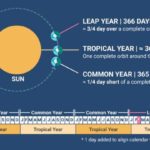Happy Birthday to me!
Today I am completing my 52 trip around the fusionball in the sky. A friend mentioned the yearly trip in an email recently, and it reminded me of something interesting I learned many years ago. When I was around 8 or 9 I bought a book called ‘Practical Astronomy with you Calculator’ which was a fantastic book explaining how to use a calculator to determine the position of objects in the sky, the locations of the planets, time of eclipses, and other similar things. Of all of the chapters the one on ‘time’ was the most interesting.
The time for the earth to go around the sun is on average 365.24219 days. The extra bit beyond the 365 ( the .24219) was the reason Julius Caesar created the leap year in 45 BC. If you add one day every 4 years you get a mean year of 365.25 days, which is pretty close to the actual. The small error wasn’t seen as that critical, and indeed this leap year scheme lasted until the late 1500s. In 1582 Pope Gregory XIII created the modern Gregorian calendar by adding an extra rule to the Julian leap year system. A leap day would be added every 4 years, but additionally every 400 years three leap days would be skipped (not added). He chose to make it such that if a year was divisible by 100, but not by 400, it would not be a leap year. This meant that the years 1700, 1800 and 1900 were not leap years even though they were divisible by 4. That small change removed 3 leap days every 400 years, which brings the average length of the year down to 365.2425, which is very close to the actual mean 365.24219.
Perhaps even more interesting was that in 1582 the errors of the previous years had accumulated enough to have a noticeable effect on the start of the seasons and the calculation of Easter. To get us back on track Pope Gregory ordered that Thursday October 4th,1582 would be followed by Friday October 15th,1582. The dates between those two don’t exist. Pope Gregory deleted 10 days from the calendar to get us back on track. It is an oddity of the calendar that most people don’t notice.
There was a cool party trick I learned for quickly calculating the ‘day of the week’ from any given date. You can ask someone their birthdate and quickly tell them what day of the week is was on (a Monday for instance). However that trick only works for days after October 15th, 1582. Equally no one can have a birthdate of October 5th, 1582, because it doesn’t exist in the Gregorian calendar.
Cheers my friends to another year of interesting and challenging problems to solve, people to meet, and the past to appreciate.


